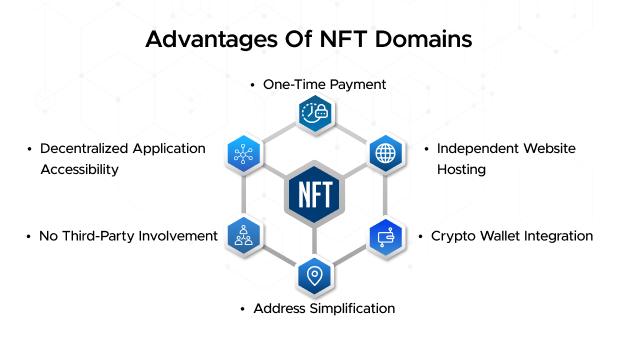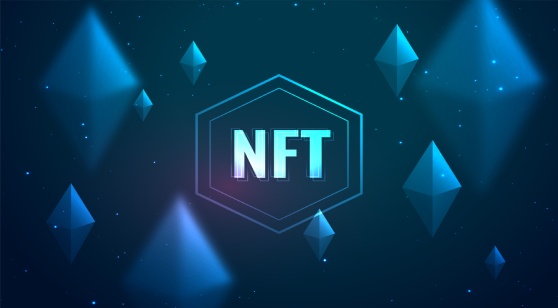-
In the ever-evolving realm of blockchain technology, a revolutionary concept is emerging that can bring a shift from conventional web addresses—the advent of non-fungible token (NFT) domains. They offer a decentralized, secure, and personalized gateway to the digital world. An NFT development company can leverage the concept of NFT domains to create innovative solutions, generate revenue streams, and provide unique value to clients and users. In this article, we explore the immense possibilities of NFT domains.
Issues with Traditional Domains
Domain names serve as digital addresses on the internet. Like a street address, they connect users to websites, services, and resources. Domain names provide a human-readable way to access the complex numerical Internet Protocol (IP) addresses that computers use to locate and communicate with each other. However, this system faces challenges, chiefly due to its centralized nature.
The current domain name system operates under the authority of organizations like the Internet Corporation for Assigned Names and Numbers (ICANN) and domain registrars. These entities have the power to approve, deny, and revoke domain registrations. It leads to a system susceptible to censorship, control, and security vulnerabilities.
Additionally, purchasing a domain name in the conventional system does not signify traditional ownership. It is like a rental or lease agreement. Consequently, domain registrars charge recurring annual fees for maintaining domain use.
Unfortunately, this system also opens the door to unscrupulous practices like cybersquatting.
Opportunistic entities closely monitor expiring domain names and quickly snap them up the moment they become available. They may then attempt to resell these domains back to their original owners at inflated prices. Or they may put domain names up for auction to the highest bidder.
This system's limitations led to the emergence of NFT domains, leading to actual ownership through blockchain technology. NFT domains sidestep the challenges of annual fees and opportunistic practices and offer a decentralized, secure, and equitable alternative.
Suggested Read | NFT Calendar Development | An Introductory Guide
How NFT Domains are Different from Traditional Domains
NFT domains provide true ownership through unique non-fungible tokens, enabling perpetual control without recurring fees. They leverage decentralized networks, offering secure transfers, reducing cybersquatting risks, and enabling innovative digital identity applications beyond websites.
Unlike traditional domain names, NFT domains operate on decentralized blockchain networks, eliminating central control points and enhancing security and autonomy. Additionally, they grant true ownership through blockchain technology.
Check It Out | Autonomous NFT Development | The Untapped Potential of NFTs
Advantages of NFT Domains
Here are some of the advantages of NFT domains:

No Third-Party Involvement
Traditional domains rely on centralized entities like ICANN and domain registrars for management. This centralization exposes domains to censorship and control.
Moreover, NFT domains function on decentralized blockchain networks. So, businesses do not have to rely on third parties for domain registration.
One-Time Payment and Ownership
Traditional domains involve "renting" the rights to use a domain name, subject to annual renewal fees. Ownership remains conditional on continuous payments, and non-renewal can lead to domain loss.
In contrast, NFT domains grant true ownership through blockchain technology. Once acquired, they are owned perpetually without the need for recurring fees.
Independent Website Hosting
NFT domains enable independent website hosting, meaning that the data and content associated with your NFT domain are not reliant on a single central server. Instead, they are distributed across a network of nodes. They ensure redundancy, improved security, and resilience against potential downtime.
With NFT domains, individuals and businesses can decide where their website data resides. It reduces the susceptibility to censorship or arbitrary decisions by centralized entities that can impact website availability.
Decentralized Application (DApp) Accessibility
Your NFT domain opens up an exciting avenue for accessing a wide array of dApps seamlessly and intuitively. Beyond serving as a traditional web address, your NFT domain becomes a gateway to a multitude of blockchain-based services and platforms.
This integration allows you to interact with dApps directly through your personalized domain. Thereby, eliminating the need to navigate complex cryptographic addresses.
Crypto Wallet Integration and Address Simplification
NFT domains offer a unique advantage by simplifying crypto wallet integration. Users can link their NFT domain to their crypto wallet address, removing the need for remembering and typing complex strings of characters.
This streamlined approach reduces the risk of errors during transactions and enhances security. It ensures that valuable assets are sent and received accurately.
Also, Discover | Cross-Chain NFT Marketplace: A Beginner's Guide
Notable NFT Domains
In 2021, the emergence of domain name NFTs marked a significant trend in the digital landscape. Notably, Budweiser, a prominent brand, entered this innovative territory by acquiring the domain name NFT "beer.eth."
This groundbreaking move aligned with a broader venture into the Web3 ecosystem, complemented by adopting an NFT artist-designed profile picture from Tom Sachs.
Another remarkable milestone in the domain NFT market is the purchase of the domain "win.crypto" for USD 120,000.
You May Also Like |How to Use Discord Marketing for NFT Promotion
Summing Up
NFT domains redefine the concept of ownership by harnessing the power of blockchain technology. They grant individuals true control over their online presence. Through features like perpetual ownership, decentralized hosting, and simplified crypto wallet integration, NFT domains offer a novel path toward a more secure, autonomous, and creative digital landscape.
For more information, you can connect with our blockchain experts.

Our Offices
INDIA
Emaar Digital Greens, Sector 61,
Gurugram, Haryana
122011.
Welldone Tech Park,
Sector 48, Sohna road,
Gurugram, Haryana
122018.















